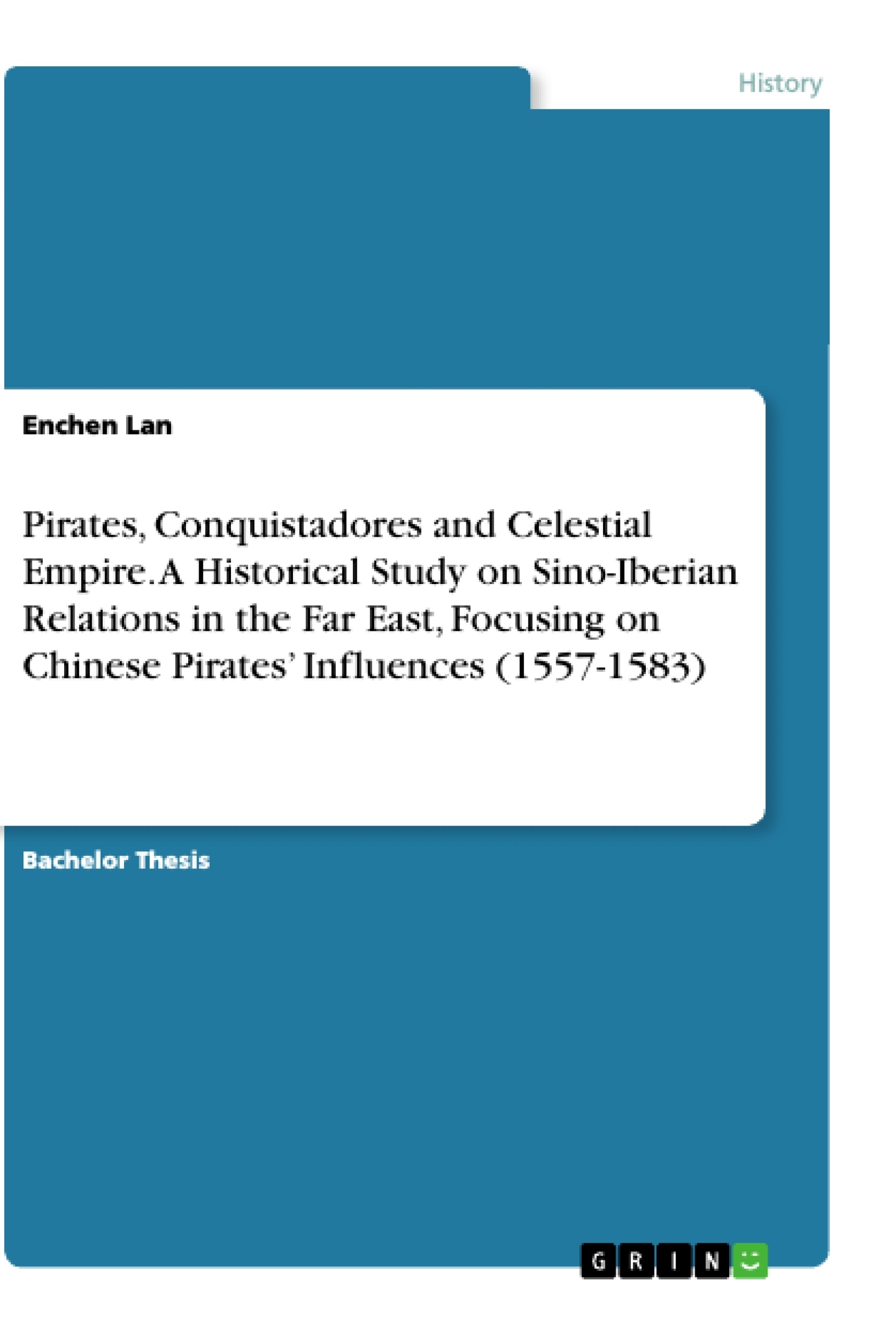The innovation of this dissertation is that 'Chinese pirates' and 'Sino-Iberian relations' are two elements that have been, to some extent neglected in previous studies, and their connection is studied in this dissertation.
History about Chinese pirates in the Ming Dynasty is often regarded as a part of domestic history in China. In past research, Chinese Pirates lacked a kind of international connection, while scholars paid more attention to the so-called 'Japanese pirates,' whose international elements have been widely recognized. Generally, the Sino-Portuguese and Sino-Spanish relations are studied separately. However, it is not conducive to understanding the Chinese attitude toward these two Catholic and Romance-languages-speaking nations from the same peninsula during the Ming Dynasty because they were collectively referred to as 'Fo Lang Ji' by the Ming Chinese. In this case, this term can be regarded as the Chinese counterpart to 'Iberians' in English during the Ming Dynasty. Hence, one nation's behaviour in the greater Iberian community would affect the Chinese attitude towards the other Iberian nation. This character is shown in the dissertation.
This dissertation's core question is: How did pirate groups led by Chinese heads influence the relations between the Iberian communities in the Far East and the Chinese Ming Dynasty from 1557 to 1583?
It divides into three minor questions according to the three stages of communication between the Chinese and Iberians: Firstly, what is the relation between 'piracy' defined by Ming central government and early Sino-Iberian military conflicts? Secondly, to enter China and stabilize its position in China, how would Iberians cooperate with the Chinese government by solving pirate-related problems? Finally, why Portuguese Macao and Spanish Manila had different results in diplomatic activities in China? Following the introductory chapter, each of the three chapters answers these minor questions step by step, and finally, demonstrates how Chinese pirates affect Sino-Iberian relations in the Far East.
Inhaltsverzeichnis (Table of Contents)
- Chapter 1: Introduction
- 1.1 Background
- 1.2 Literature Review
- 1.3 Research Question
- 1.4 Methodology
- Chapter 2: First-Comer's Opportunity in Macao
- 2.1 Introduction
- 2.2 'Fo Lang Ji': Negative and Positive Connotations
- 2.3 'The Emperor is far away': Localism in Guangdong
- 2.4 Opportunities
- Chapter 3: Late-Comer's Failure in the Philippines
- 3.1 Introduction
- 3.2 Guangdong's Disaster but Macao's opportunity
- 3.3 'Wokou' in the South China Sea
- Chapter 4: Unification in Peninsula, Disintegration in the Far East
Zielsetzung und Themenschwerpunkte (Objectives and Key Themes)
This dissertation explores the intersection of Chinese pirates and Sino-Iberian relations in the Far East, specifically focusing on the period between 1557 and 1583. It aims to understand how Chinese pirate groups influenced the dynamic between the Iberian communities and the Chinese Ming Dynasty during this era.
- The impact of Chinese pirates on Sino-Iberian relations in the Far East.
- The evolving definitions of "piracy" in the context of Ming China and its relationship with Iberian communities.
- The strategies employed by Iberians to establish themselves in China through cooperation with the Chinese government.
- The contrasting outcomes of Portuguese Macao and Spanish Manila in diplomatic interactions with the Ming Dynasty.
Zusammenfassung der Kapitel (Chapter Summaries)
Chapter 1: Introduction provides an overview of the historical context, including the expulsion of Portuguese diplomat Tomé Pires from Beijing in 1521, the subsequent portrayal of Portuguese as deceitful by Malay envoys to the Ming court, and the significance of the "stone" erected by Jorge Alvares in 1514.
Chapter 2: First-Comer's Opportunity in Macao delves into the early interactions between Portuguese and Chinese, including the connotations of the term "Fo Lang Ji" and the localism prevalent in Guangdong province.
Chapter 3: Late-Comer's Failure in the Philippines explores the challenges faced by Spanish in the Philippines, contrasting their experience with Portuguese success in Macao. It also discusses the role of "Wokou" in the South China Sea.
Schlüsselwörter (Keywords)
The dissertation focuses on Sino-Iberian relations, Chinese pirates, Ming Dynasty, 'Fo Lang Ji', Portuguese Macao, Spanish Manila, Wokou, and diplomatic history in the Far East.
Frequently Asked Questions
What is the core research question of this dissertation?
The study asks how Chinese pirate groups influenced the relations between Iberian communities (Portuguese and Spanish) and the Ming Dynasty from 1557 to 1583.
What does the term 'Fo Lang Ji' mean in this context?
'Fo Lang Ji' was the term used by Ming Chinese to collectively refer to Iberians, meaning that the behavior of one nation often affected the Chinese attitude toward the other.
Why did Macao and Manila have different diplomatic outcomes?
The dissertation explores how the Portuguese in Macao successfully cooperated with the Chinese government to solve pirate problems, whereas the Spanish in Manila faced different challenges.
What is the significance of the year 1557 in this study?
1557 marks the beginning of the period studied, coinciding with the establishment of the Portuguese presence in Macao and the intensification of Sino-Iberian interactions.
How does the study redefine 'Chinese pirates'?
It moves beyond seeing piracy as purely domestic Chinese history, highlighting its international connections and its role as a bridge or barrier in foreign diplomacy.
What role did localism in Guangdong play?
Localism in Guangdong created unique opportunities for Iberians to establish themselves, often exploiting the distance between the local administration and the central Ming government.
- Quote paper
- Enchen Lan (Author), 2020, Pirates, Conquistadores and Celestial Empire. A Historical Study on Sino-Iberian Relations in the Far East, Focusing on Chinese Pirates’ Influences (1557-1583), Munich, GRIN Verlag, https://www.grin.com/document/991976



